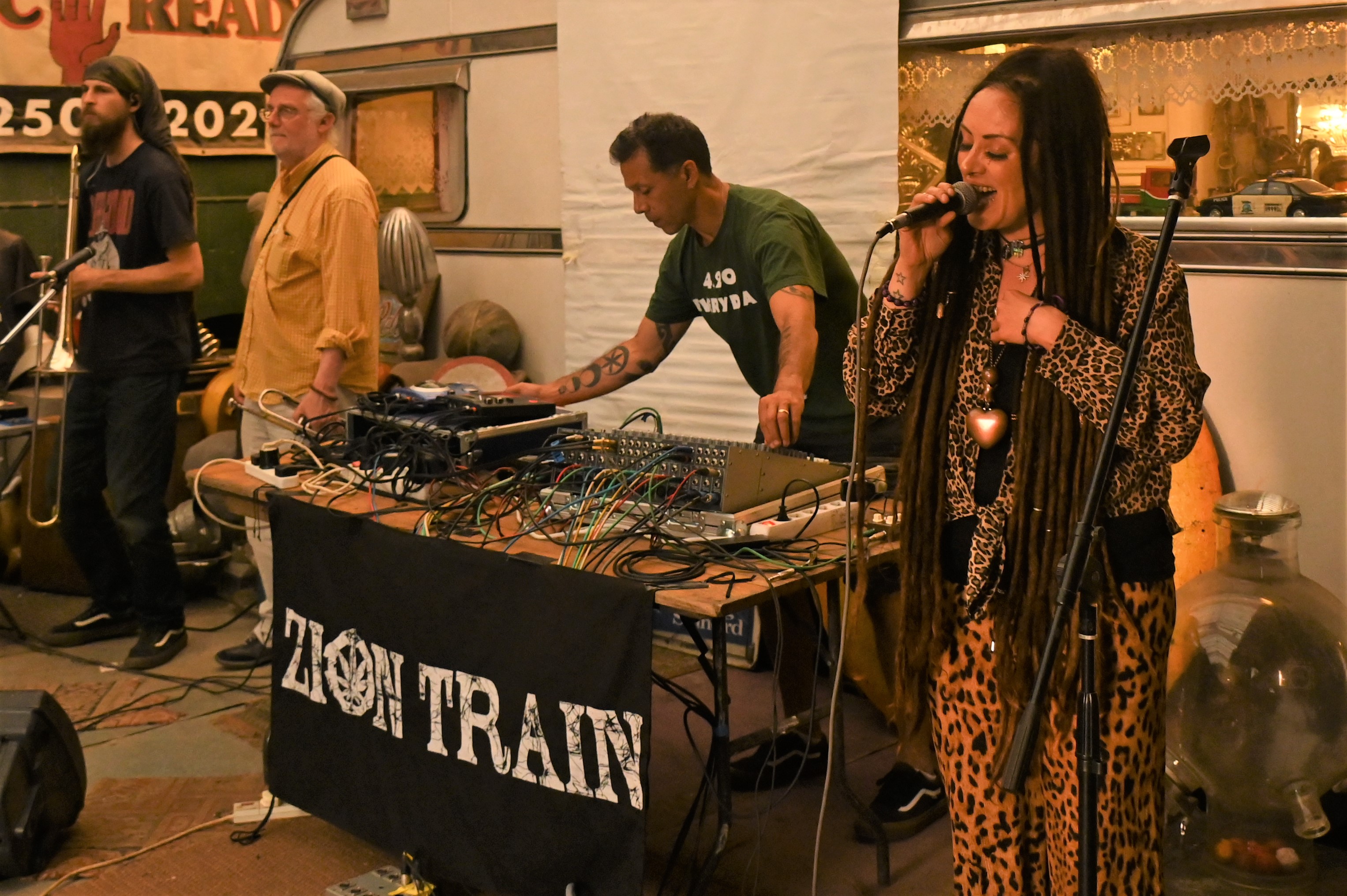On 17th of June, 2023, we sat down with Neil, Dave, and vocalist Cara from dub legends Zion Train, for a pre-gig drink at Rockaway Park in Somerset.
Peppermint Iguana could have been so very different, if Zion Train had not been so helpful. They were the first band I interviewed and will always have a special place in my memories. They didn’t just answer questions for me, they introduced me to loads of other like-minded souls, they sent me promos, they put me on guest lists, and perhaps most importantly – they became friends.
The Zion Train has meandered and wandered along many tracks over the years, with crews coming and going and a host of passengers hopping on and off. The only constant has been driver Neil Perch and brass player Dave Hake.
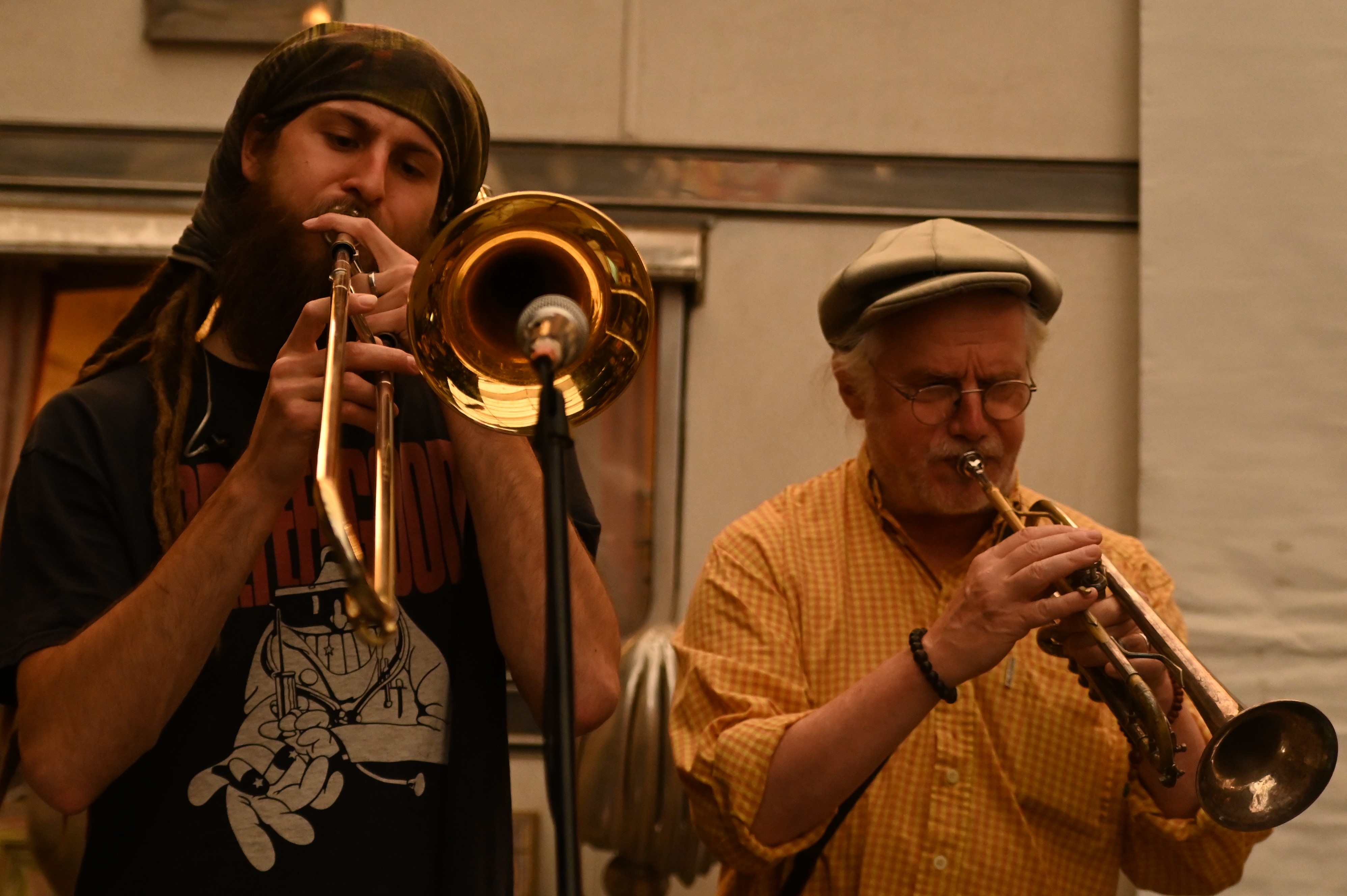
The band has gone through several phases. Initially very dubby, albeit with a digital edge. Then they upped the tempo and became quite bouncy. Originally based in Oxford in 1988, they moved to London for a while, then they moved to a small holding in West Wales for a while, but that original line up drifted apart. Molara and Colin still live in West Wales, but Neil has made a life for himself in Germany. With the departure of Molara the vocal duties became more flexible, with several guests, including Pat Fulgoni from Kava Kava on the mic and Jonno ‘Dubdadda’ from Nucleus Roots in particular, bringing a ragga vibe to proceedings.
Cara, formerly of the Defekters, has been with them for a few years now and they have hit on a funky dubby groove again.
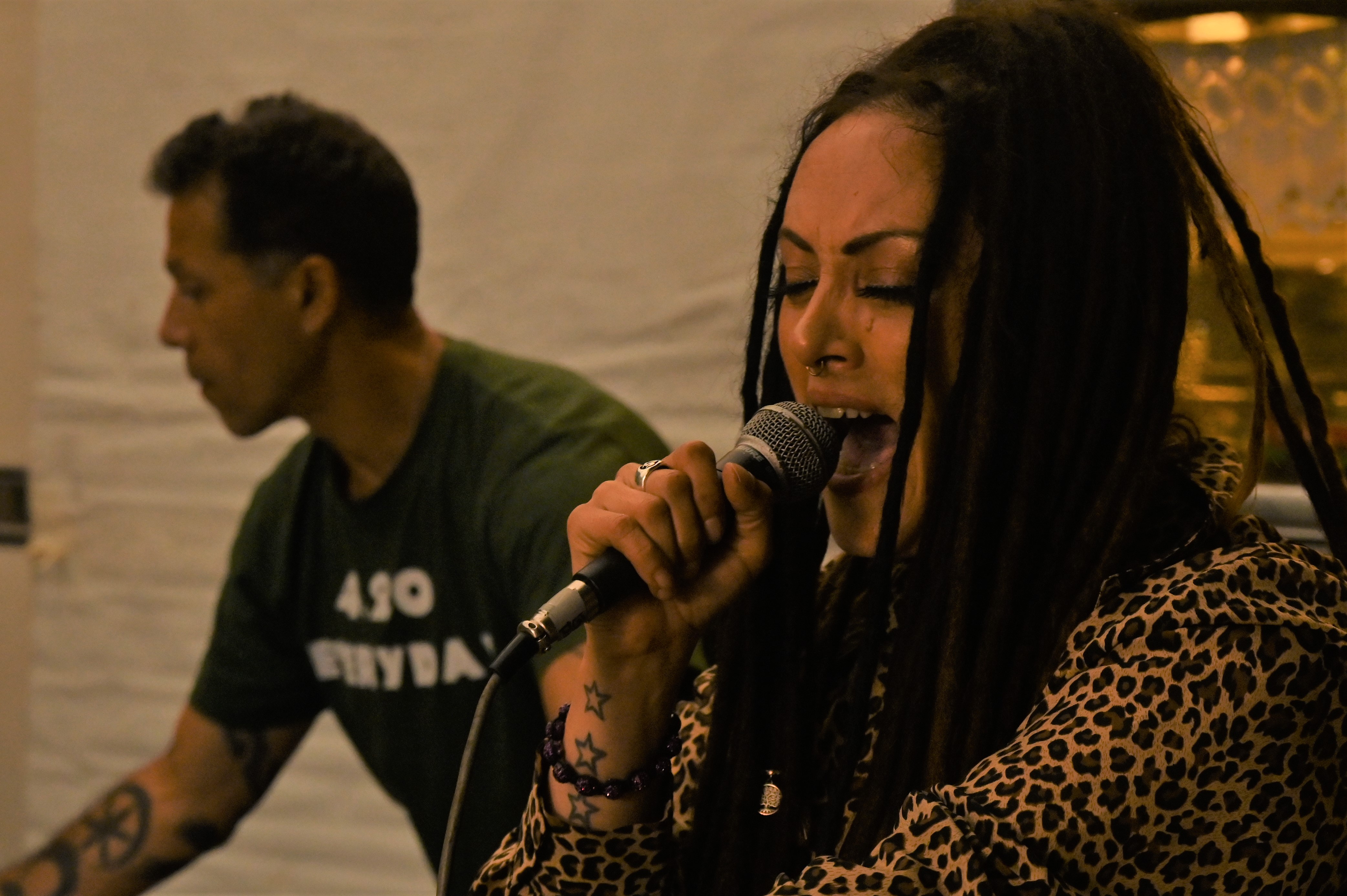
Right, Neil, 1995 was the first time I interviewed you, so that’s almost 30 years ago now. There’s been lots and lots of changes since then in terms of different types of sound, different members of the band and what have you. I know Dave is still with you, but what would you say is the one constant thread through all of that time that makes Zion Train, Zion Train?
NEIL: Well, apart from me and Dave, the whole point is the attitude and the approach. The attitude is one of a DIY music collective and the approach is to do it all our making music and music business as we see fit, not as how it’s predetermined by the structures around us.
So, it’s about independence, DIY attitude and trying to lead as an example in everything we do to other people, not necessarily just in music, but in life. We try not to be influenced by how people say you should do what we do, play music, record music, perform music and be a band. We try and do it how we see fit and we hope that that provides a positive example for other people to do it, not how we see fit, but how they see fit.
That’s the whole point. Many parallel approaches provide much more creativity and strength than everyone treading the same path.
With changes of personnel and collaborators, do you change the sound to match the collaborator or does the collaborator have more influence on what the sound is? If you pick a song for Cara or Jonno or whatever, do you have them in mind when you’re creating the sound?
NEIL: It tends to be a bit more organic than that. Occasionally, I’ll come across someone, an instrumentalist or a vocalist and think, yeah, that idea would work great with them. But actually, more often than that, it tends to be that we meet as people, be it Cara, Dave, Jonno, someone like Paolo Baldini who plays some of the bass and guitar on the latest album and then we develop ideas together. So actually, it’s more an organic grouping together of the people and then a sound developing from that grouping together of people.
It’s different with different people and personalities and with different people who have different talents because some people, for example, some singers have the talent to write and perform. Some singers have more talent just performing.
So there’s a song on our last album, ‘Illuminate’, called ‘Politrix’, sung by a fantastic singer called Prince Jamo, who’s from Birmingham. Great singer, well-known in the underground reggae scene. But the content of the songs he writes himself doesn’t really fit what Zion Train stands for. But his voice is a magnificent musical instrument. So for his song, I actually wrote it, sang it, recorded it and sent that to him and said, that’s a song I’d like you to sing much, much better than I possibly can because I’m a terrible singer. And he did it and he caned it. It’s fantastic.
Now, someone like Cara, her ideas and her theoretical approach to what she’s doing in music match Zion Train’s path almost stride for stride. So that’s much more a question of me saying, do you like this rhythm? Do you like that rhythm? Have you been working on anything that might fit with that? And the idea will develop from there. It’s a very different starting point.
One of the questions I was going to ask is, who writes the songs? So how often do you say you write the songs and how often would the singer write them?
NEIL: Well, sometimes it’s a mixture. It’s not always one or the other. But Cara, for example, writes for lyrical and melodic content, she writes 99.9% of her things.
I wrote songs for Dubdada and Prince Jammer. The only song we have in Italian or in a foreign language on Zion Train’s album, sung by a lady called Michela Greiner, who’s from Pordenone in Italy, I wrote that one for her as well.
Yeah, it very much depends on the individual that you’re dealing with. Also, some of the instrumentalists, some of the stuff, for example the live bass lines. I play on synth in a studio but I can’t play a bass guitar. So when I prefer them to be played on a bass guitar, rather than a synth bass, then I’ll send them to someone like Paolo Barbini. He’ll play them but he’ll also elaborate on them because there’s a lot more you can do on a live bass than you can on a synth bass. If you’re good on a live bass, you play much better than a novice on a synth bass, which in effect I am.
With the brass parts, for example, a lot of them start with Dave on a chordal structure that’s already written. Some of them start at a synth line that I’ve written. Some of them were just brought into existence in a brass session.
So it really depends on the individual, how much they’re in tune with what we’re doing as a group of people, and also their level of talent and engagement. Obviously we’ve got the amazing voice of Cara with us now. But she also plays piano and guitar and various other things.
CARA: I’ve put a bit of melodica on the new album. And then I think on one song I chucked a very bare-bones, put-together song to Neil, and then Neil just pulled it out and brought all the magic to it, really, with the production and the structure of the song. But not so much piano and guitar, just a bit of melodica. And I’d spoil them away.
Cara is an accomplished guitarist. She also performs solo as Cara Means Friend, singing and playing acoustic guitar, but does she ever play guitar with Zion Train?
CARA: No, no, no. We’ve never subjected anyone to that. And do you know what? In the context of Zion Train, I wouldn’t want to. Because it’s really nice for me to be able to just lend myself to the vocal and the content of the lyrics.
Piano was my first instrument, but they’re really hard to take around on the road with you. So I only ever picked up the guitar as a way of putting the music out there, the songs out there. But I’ve never felt 100% comfortable behind a guitar, if I’m completely honest.
So with Zion Train, I get to feel it more, and I get to sing, and I really get to just throw myself into the melodies, and I like it that way.
Obviously when you had Dabdada with the band regularly, it was a much more masculine vibe to your sound. He’s not here tonight, but do you find that has an influence on the tunes you play, for instance, trying to get a female voice singing the sort of stuff that Dabdada used to sing, or do you just leave those out?
NEIL: No, it really doesn’t work like that. See, we don’t start and try and make a certain sound when we’re playing. We start and we make the sound we make. Tomorrow we won’t try and replicate what we did today, even though it’ll actually be Aidan who’s playing trombone today. Tomorrow we’ll have a tenor sax player with three of us, and a tenor sax player from Italy. And that’s sort of the antithesis of what we do.
It’s more like a musical expression of the energy that those people can produce together in that moment. So on one day, Carla will have certain energy, and it will totally influence what we do, because she’s at least a quarter of what’s happening with the four of us. And the next day, the other three of us could be the same people, have exactly the same energy, and her energy might have changed, so therefore the show will change.
And actually, I really welcome that. You know what I hate in music? I hate the whole parade of bands playing live to sell their music. I mean, it’s a bit historical now, because no one makes any money from selling physical product anymore, but I’ve been to so many gigs where you’ve got these amazing players, these super famous bands playing these beautiful instruments, and it sounds like the CD.
And I’m thinking, well, why the fuck don’t you stay at home and listen to your CD? Live music should be a different experience to recording music. And you know, that’s only my opinion, but it should also be something, the technical set-up as Andrean allows us as well, something that actually never sounds the same twice. That’s important to us.
Because then you get the real aspect of the place, the people, the audience, influencing what the band sounds like. And therefore, of course, when you have a different audience in a different place, the band will sound different, even if it’s exactly the same line-up in the band. And if you apply that back to what you asked, we wouldn’t ever expect or anticipate that we’d sound anything like Zion Train with Dubdada when it’s Zion Train with Cara. It doesn’t enter our approach at all.
I try to avoid tribute acts, but I do have a soft spot for Pink Floyd. So I went to see the Australian Pink Floyd and I spoke to somebody, he said, it’s brilliant, it sounds just like the album. And I said, well, if I went to see the real Pink Floyd and it sounded like the album, I’d be pissed off. That’s not what you go to a live gig for, is it?
NEIL: Yeah, exactly.
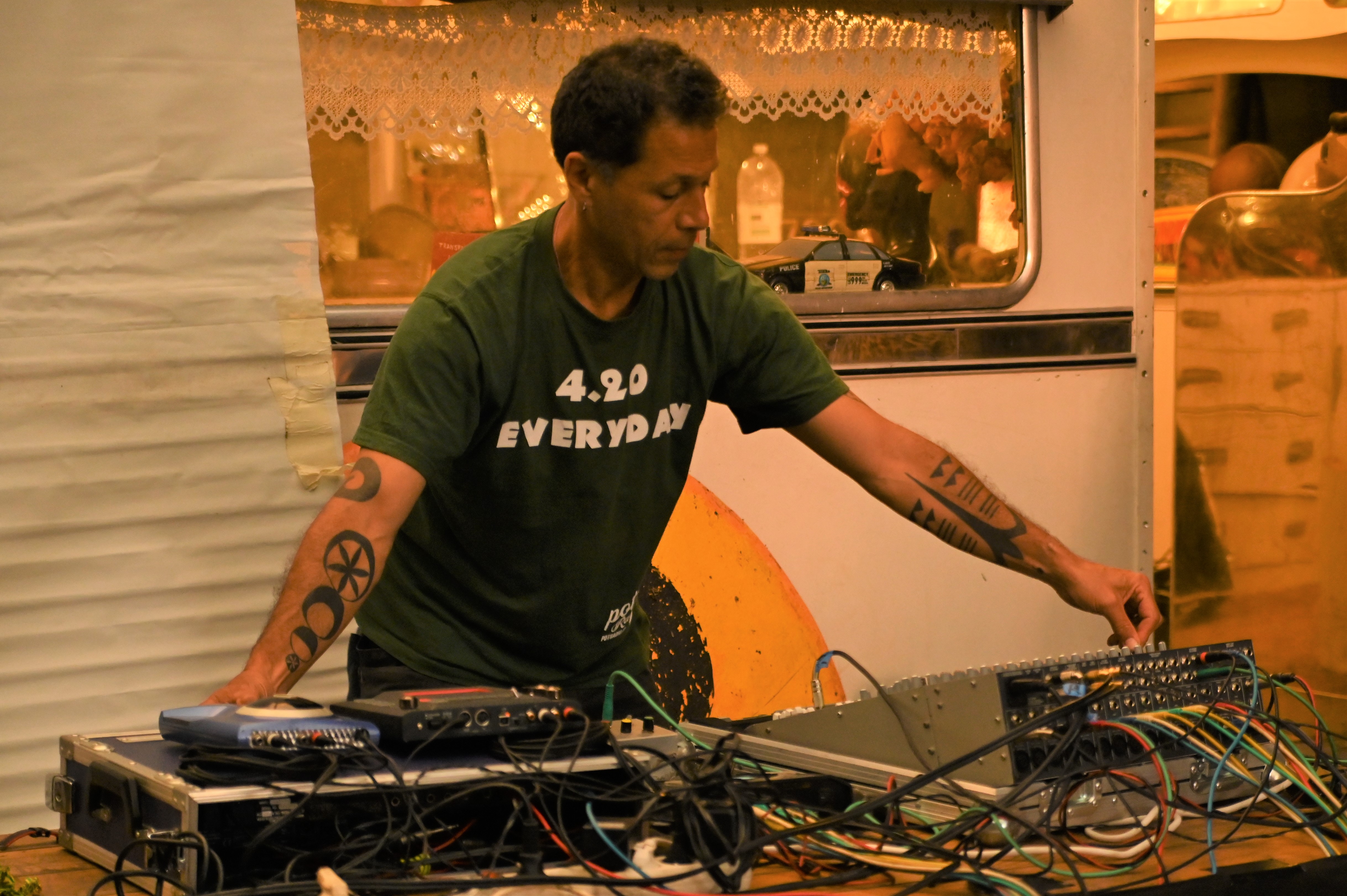
Watching from afar, you seem to be playing all over the place, all the time. Does travel still excite you or does it become a chore and a job at the time?
NEIL: Well, the physical travel is a chore, I won’t lie. So I got up at 2am UK time today, left my wife and kids in bed, drove through the night to a train station, got an hour’s train to the airport, flew to Heathrow, got a hire car and linked up with everyone else along the way. That’s exhausting.
Being in the places is always inspiring. So I can separate the actual physical travelling and trawling through train stations, airports and the rest of it from being in a great place again. So tomorrow we’re going to County Donegal.
It’s a long way from here, but it’s a wonderful, wonderful spot. We’re going, I’ve been there before, so I’m really excited to be there. I’m not so excited to get up at the crack of dawn and go back to the airport.
I look to Cara. Even before you joined Zion train, you seemed to be peripatetic, sort of busking everywhere and travelling everywhere. Has this just fallen right into your pattern of life anyway, travelling all over the world?
CARA: Not travelling all over the world, Clint. That’s a new one for me. I think before Zion train, I think with the Defekters, we did one little stint over in Germany, which lasted, I think, two or three days. But before that, I hadn’t really travelled out of Britain with the music. But I love it, yeah.
It’s amazing. Even though I’m not the best of flyers, I’ve challenged my fears because of the payoff at the end of it, to just be in all these different places with different cultures, experiencing how different audiences are across Europe, is a completely different thing to the UK. So I consider myself blessed to be able to do it.
Neil is a very busy chap. The band gig all over the world. But apart from live gigs there’s the recording of Zion Train music, Zion Train remixes of other people, running their own record label. Does Neil ever get to take a break?
NEIL: In my time off, I mainly spend with my children. I wouldn’t consider that my time off. I consider that my day job, to be honest. It’s my priority. It’s a bigger priority in my life than Zion Train is. And I’m blessed to live in a very wonderful place to bring up children, lots of space, and I’m blessed with a wonderful family. So that’s what I do in what you might refer to as spare time, but I would refer to it as my priority time, really.
My wife’s German. I do have a son in England, but he’s an adult. I have a granddaughter in England as well, so it keeps me busy.
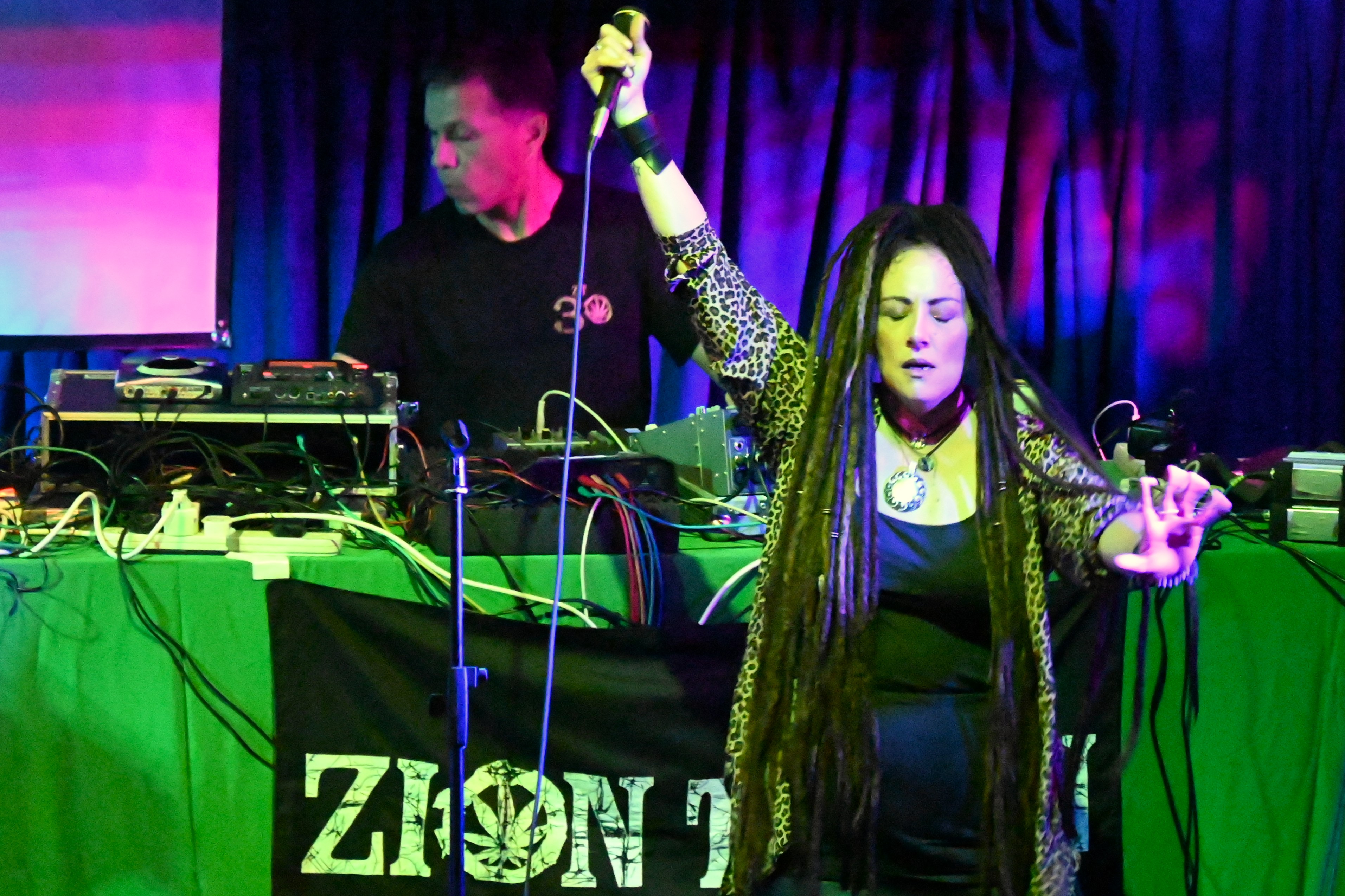
I’ve noticed since Cara has joined the band, you play in places like this, Landed and The Lost ARC and things. Do you think there’s an influence there on the more grass-roots venues that you play in, etc?
NEIL: Well, it works in several ways. People play in different situations, and Cara, of course, with the next album, she’s going to be playing in brings a whole lot of contacts to our world that we weren’t really working with.
For example, the people at Landed Festival are Cara’s good friends. People at Naughty Corner that we’re playing this coming summer, they’re Cara’s good friends, so that’s a direct link. I think the difference, if you’re a gig promoter, and you’re looking at from that perspective, the difference between Cara and Dub Dada is something that’s maybe more appropriate to grass-roots UK situations like The Lost ARC, relative to something that’s more appropriate to very urban UK situations.
And I think that speaks volumes for the way those two excellent performers perform. Dub Dada is very classically reggae MC, and Cara’s a singer with a lot of important things to say for herself. That’s the way I’d say it’s panning out.
Plus it’s been really lovely to be able to step back into those worlds with Zion Train. I think it just further shows, really, when you break it down it’s a community thing as well, so everybody’s just been so, like Mark, Robbie, The Lost ARC, all the people have just been supportive through and through, all the way through. Whatever you do, they’re like bring that, bring that, which I think just shows how strong the underground community of music is. So it’s lovely to be able to do those things.
At this point the Sound System in the gig shed is cranking up the volume, so it’s had to hear ourselves talk. But that’s a good point to stop anyway. Zion Train have been on an incredible journey over the last thirty odd years. We went through a spell when our paths did not cross for a while, but we seem to be orbiting the same planet at the moment and regularly bumping into each other. Again. We hope that lasts for a while, because we are digging the dubby vibrations they are giving off at the moment. But they are not ones to let the grass grow under their feet. Who knows what they will be doing in five years time.? And we like that spirit of constant evolution. Forward the revolution.
LINKS
